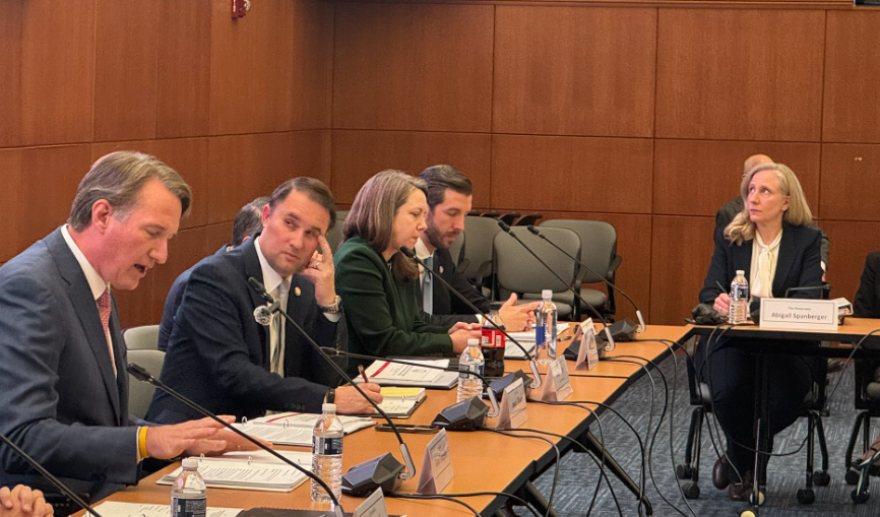Recent economic forecasts in Virginia have placed data centers as one of the Commonwealth’s fastest growing economic sectors.
And while some worry the artificial intelligence boom those data centers are powering resembles the internet bubble in the late 90s, Governor Glenn Youngkin is more optimistic.
According to a recent state study, 84% of the total capital investment across all economic development projects announced by the Virginia Economic Development Partnership were data centers. They’ve created tens of thousands of construction jobs and over $9 billion in annual GDP for the Commonwealth.
And while processor companies like Nvidia are posting positive economic numbers, others fear a combination of factors could be creating an artificial bubble around artificial intelligence. But Governor Glenn Youngkin disagrees.
“There’s a huge demand in this sector; they’re making money out of this sector. It’s really different than fork.com and knife.com that came in the internet bubble," Youngkin said after Monday's meeting of the Governor’s Advisory Council on Revenue Estimates, or GACRE. "These companies are building the ability to manufacture intelligence.”
Democratic Senate Majority Leader Scott Surovell knows the economic impact data centers have, including those jobs and tax revenue. But he has concerns.
“Did you see how much the last data center land sale was in Northern Virginia? $6.5 million per acre," Surovell told Radio IQ. "If we are in fact in an AI bubble, Virginia's going to get really wacked by it if the bubble pops.”
Notably the taxes generated on that land sale go to pay for the locality’s roads. And in Loudoun County, where data centers are at the nation’s highest concentration, the property tax rate decreased, an outlier in a year that saw similar taxes increase across Virginia.
Whether or not the AI bubble is real, Virginia legislators will have to tackle the myriad of power and other issues connected to data centers once the 2026 legislative session kicks off in January.
Monday's GACRE meeting also brought some of Virginia's biggest business leaders to Richmond to help forecast the Commonwealth's economic future.
Following negative economic forecasting meetings for Virginia’s House and Senate, Youngkin once again pushed back on economic concerns about President Donald Trump’s impact on the commonwealth.
“I think they were disconnected from the facts,” Youngkin told reporters of Democrats finger pointing on federal cuts and job losses.
He said previous annual growth estimates were admittedly better, around 8%, but this year, “stick monetary policy” and depletion in consumer savings will drop 2026’s prediction to about 4%.
He promised a more "prudent" budget in line with those forecasts.
But Senator Surovell reiterated concerns about Trump’s impacts on the Commonwealth. And while Youngkin questioned Democrats' connection to the facts, Surovell pointed to Trump’s undelivered trade promises and still-unclear plans for federal jobs from Northern Virginia to Hampton Roads.
“These things are going to have big impacts on the economy that people aren’t seeing and the governor’s not acknowledging," The Fairfax-area official said.
And Republican Senate Minority Leader Ryan McDougle joined Youngkin in a more optimistic economic outlook. While he couldn't share specifics from the GACRE meeting, he said the consensus in the room wasn't all doom and gloom.
"There was a lot of positive outlooks for Virginia," he said, before stressing the billions more in state revenue that he said could help prop up the state.
Among bright points was Trump's promise to increase defense spending, a large sector of Virginia's federal contractor business.
"It looks like we're going to grow economically and that is positive for Virginia," McDougle said.
But Surovell dinged McDougle's theory for confusing increased state tax revenue with increases in the costs of everyday goods.
"If inflation is at 3% and your revenues from sales taxes are increasing by 3% that just means everything is getting more expensive," he warned.
Monday's GACRE meeting was the last ahead of Youngkin's outgoing budget presentation. Among concerns is how the state may have to make up for lost federal funds for American Care Act marketplace subsidies. Democrats have floated the idea of using hundreds of millions in state funds to make up the difference.
But Youngkin has faith in President Trump's rumored 2-year extension of premiums. Details of the plan were leaked Monday, but specifics are still unclear, and House Speaker Mike Johnson said any extension on coverage would require "massive reforms" to the system.
Notably Governor-elect Abigail Spanberger was also in attendance for Monday's GACRE meeting. She didn't provide any comment to the press after the meeting wrapped, but in a Morning Joe interview Tuesday morning she doubled down on economic concerns.
"Everywhere I travel, across Virginia, from the reddest to the bluest, there is this feeling of uneasiness," she said. "Even if they can make the payment at the pharmacy today, they worry about the cost tomorrow."
This report, provided by Virginia Public Radio, was made possible with support from the Virginia Education Association.


